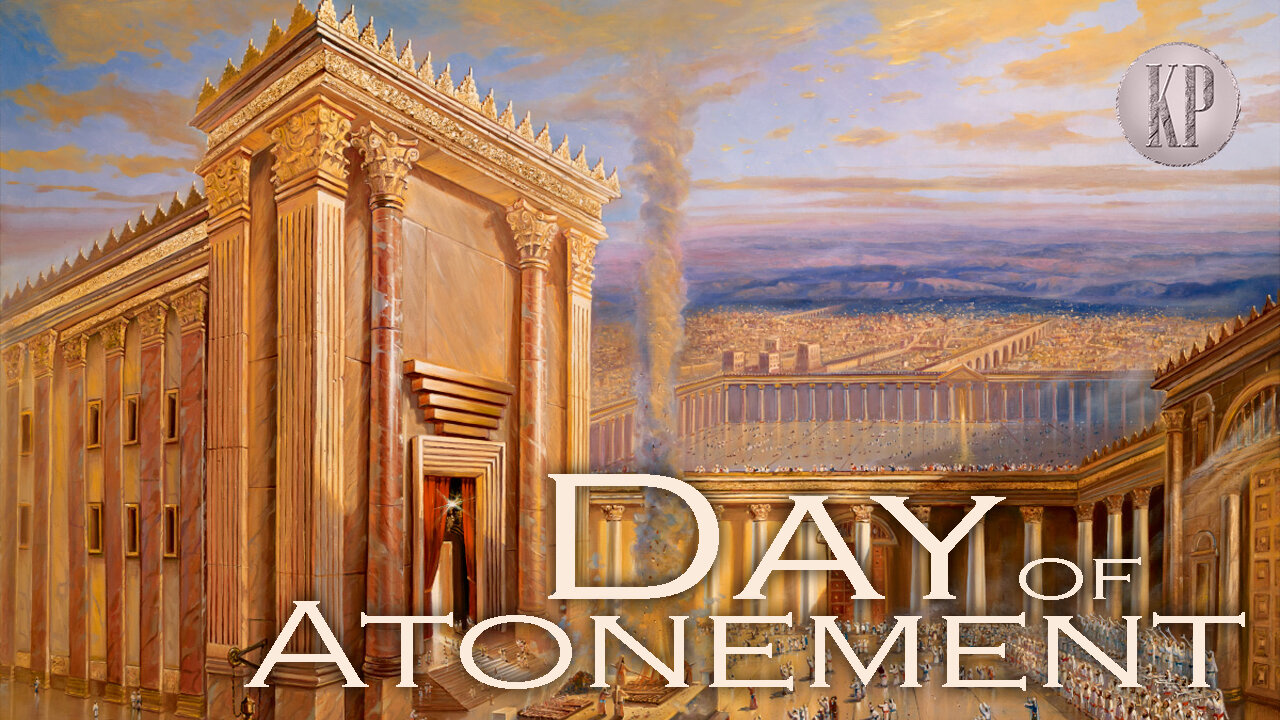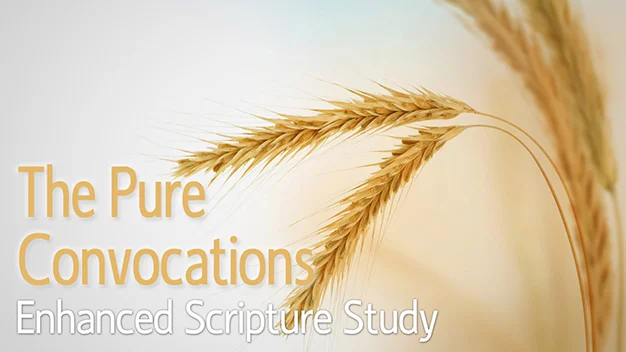We covered the Day of Atonement in the Pure Convocations video, and there point out that, despite Atonement being considered a day of fasting by Jews, Christians, and many Israelites for a long time, Scripture reveals that the word translated as “fasting” actually refers to something else. We are to be occupied with being lowly and submissive on that day, which is part of the process of being reconciled to Yah through deep repentance for our past sins. Passover pictures a kind of reconciliation as well, but that of Yah with his firstborn son, true Israel, the nation. Yah’s mighty arm freed Israel from the clutches of Egypt so that Israel could serve him in the wilderness (Exodus 7:16). This act reconciled Israel to Yah.
The Day of Atonement, on the other hand, is meant to reconcile all nations to Yah who join themselves to Israel, and not just native-born Israelites.
29“And it shall be a statute to you forever that in the seventh month, on the tenth day of the month, you shall humble yourselves and shall do no work, either the native or the stranger who sojourns among you.”
—Leviticus 16:29
Here, “the stranger” is to be granted this reconciliation by being humble before Yah and abstaining from work on that day. Verses 31 to 33 further state:
31It is a Sabbath of solemn rest to you, and you shall humble yourselves; it is a statute forever. 32And the priest who is anointed and consecrated as priest in his father’s place shall make atonement, wearing the set apart linen garments. 33He shall make atonement for the set apart sanctuary, and he shall make atonement for the tent of meeting and for the altar, and he shall make atonement for the priests and for all the people of the assembly.
—Leviticus 16:31 – 33
The high priest was to make atonement “for all the people of the assembly,” including “the stranger.” This reconciliation therefore extended to the nations joined to true Israel. The Feast of Trumpets, which we covered in another article, ushers in the millennium, which will see countless Gentiles being spared following the war that is waged against Yeshua upon his return to earth. Those very Gentiles will thereafter go up from year to year to worship Yah and keep the Feast of Booths, we are told in Zechariah 14:16. While the Feast of Trumpets is literally fulfilled by Yeshua’s return to earth, the gathering of the elect, and the resurrection of the righteous dead, Day of Atonement will follow with a literal fulfillment that will involve the Gentiles who survive his return. They, along with true Israel, will humble themselves before Yah and be reconciled to him through the atoning work of the high priest, Yeshua. Sins will be repented of in earnest and forgiven, and every living temple will be cleansed.
What Day of Atonement truly pictures is Yah’s direct confrontation with his great enemy: sin. Day of Atonement acts as the battlefield for this confrontation, and its literal fulfillment will see Yah seek out and destroy its very existence by removing it from each and every soul in his Kingdom. How will he do this? By allowing these souls to become fully lawful of course; and each and every one of them will long to do so.
Thus will be fulfilled the words of the Psalmist, David:
27All the ends of the earth shall remember and turn to Yah, and all the families of the nations shall worship before you. 28For kingship belongs to Yah, and he rules over the nations.
—Psalm 22:27 – 28
9All the nations you have made shall come and worship before you, O Yah, and shall glorify your name.
—Psalm 86:9
Yah, speaking through the prophet Isaiah, also promised that:
23“From new month to new month, and from Sabbath to Sabbath, all flesh shall come to worship before me, declares Yah.”
—Isaiah 66:23
At this future time, during the millennium, Israelites and Gentiles alike—having been reconciled to Yah through Atonement—will come to worship before Yah from month to month, and from Sabbath to Sabbath, proving that Sabbaths, including his set apart convocations, have never been done away with. Sin has caused man to put aside the commandments; for sin, we are told by the emissary John, is lawlessness (1 John 3:4). This very lawlessness—this collective sin—pollutes our beings, our inner temples, which necessitates cleansing via the Day of Atonement. And in the ultimate fulfillment of the Day of Atonement, not only will sin be removed from the redeemed in the millennium, but the root of sin will also be removed, that being Satan himself, along with his demons. This is illustrated in Leviticus 16:20 – 21 through the act of the priest, who sends a scapegoat to a remote place in the wilderness with the sins of Israel upon its head.
The culmination of the Day of Atonement effectively roots out sin. And this is what we are to do during the course of this 24-hour observance, through dedicated, pinpointed repentance of past lawlessness. We are to search our hearts diligently on this day and call up all shortcomings on our part, as well as all offenses and wrongdoings we have committed against others. With humility we must come before Yah and ask his forgiveness for all these things, and plead with him to make us whole and worthy vessels that we may not stumble in the same way again. The experience should leave you in a lowly state wherein you are emptied of your past transgressions. This is the level of affliction of the soul that is required, which goes beyond mere fasting. It is a sign of true humility also, which is highlighted in Yeshua’s parable of the tax collector:
9He also told this parable to some who trusted in themselves that they were righteous, and treated others with contempt: 10“Two men went up into the temple to pray, one a Pharisee and the other a tax collector. 11The Pharisee, standing by himself, prayed thus: ‘Elohim, I thank you that I am not like other men, extortioners, unjust, adulterers, or even like this tax collector. 12I fast twice a week; I give tithes of all that I get.’ 13But the tax collector, standing far off, would not even lift up his eyes to heaven, but beat his breast, saying, ‘Elohim, be merciful to me, a sinner!’ 14I tell you, this man went down to his house justified, rather than the other. For everyone who exalts himself will be humbled, but the one who humbles himself will be exalted.”
—Luke 18:9 – 14
Fasting can be done without humility, and true humility can be achieved without fasting. Pairing the two is of great benefit, however, but the end result of your Day of Atonement experience should see you being humble before Yah as you petition for his mercy and forgiveness, with not so much as your eyes lifted to heaven. Remember that Yah actively roots out sin during the process of atonement, and the root is Satan himself. In speaking to a crowd of Judahites, among whom stood a few scribes and Pharisees, Yeshua said:
44“You are of your father the devil, and your will is to do your father’s desires. He was a murderer from the beginning, and does not stand in the truth, because there is no truth in him. When he lies, he speaks out of his own character, for he is a liar and the father of lies.”
—John 8:44
Satan is here called the father of lies, and the father of those with evil desires akin to his own. This is the reason Satan and his demons must be removed from the earth during the millennium. And in the final judgment, after all is said and done, the book of Malachi sums it up best:
1“For behold, the day is coming, burning like an oven, when all the arrogant and all evildoers will be stubble. The day that is coming shall set them ablaze, says Yah of hosts, so that it will leave them neither root nor branch.”
—Malachi 4:1
“Evildoers will be stubble,” we are told. Of them, there will be left “neither root nor branch.” Satan is the root, and his followers are the branches of that evil root. The opposite is true of the righteous. Yeshua said:
5“I am the vine and you are the branches. The one who remains in me, and I in him, will bear much fruit. For apart from me you can do nothing.”
—John 15:5
Atonement and reconciliation can also not be achieved apart from Yeshua, who is both our high priest and great sacrifice. He is the sin-offering for our atonement, and his blood is actually the covering for our sins. In both senses, he fulfills the Hebrew phrase for Atonement, hakkippurîm (H3725), meaning sin-offering of the atonement, as well as its root, kaphar (H3722), which means to cover over, pacify, propitiate. In other words, we can plead to Yah all we want on the Day of Atonement, but without faith in Yeshua and receiving him as our sacrifice, there is no reconciliation with Yah. Therefore, continue as a worthy branch attached to the good vine by abiding in HaMashiach (The Messiah) during your day of humbling.
Other Articles You Might be Interested In
Feedback Form
Companion Video
TESTIMONIALS
Thank you, KP, for another wonderfully compiled article. I always admire the way scripture interprets itself by means of close examination. I have been recently pondering Yeshua's presence here on earth. While I do believe the blood atonement is paramount, I have also been considering the fact that Yeshua is the very Word as his essence. I feel many are so locked in to the physicality of the Messiah, they miss the significance of his rejection. In my understanding, the most relevant piece His presence as the Word made flesh is the fact that when he was rejected by most, they were not just rejecting a person, they were rejecting the very Word of Yah. I believe this ties in with the understanding that scripture tells us the names in the Book of Life were written before our exsistences were known. While we are given the opportunity to accept the Elohim and His ways, He has known before our existence who would and who would not. It would seem as though Yah has selected those who would fear Him, rather than the earthly viewpoint that we select Him through our belief system. I feel this is a rather difficult subject to discuss, so I hope I have conveyed my thoughts concisely. I hope you and your family are healthy and remain safe through these trying times. Shalom.
—Katie B.
My response to Katie B.:
Shabbat shalom Katie!!! Great to hear from you!
Isaiah records:
9you whom I took from the ends of the earth, and called from its farthest corners, saying to you, “You are my servant, I have chosen you and not cast you off." —Isaiah 41:9
And Yeshua stated plainly:
19If you were of the world, the world would love you as its own; but because you are not of the world, but I chose you out of the world, therefore the world hates you. —John 15:19
As you correctly stated, we are chosen by Yah and his Son. Never the other way around. Your thoughts are wonderfully received.
—Kingdom Prepper






